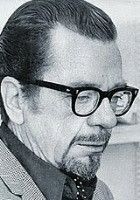John Williams
John Williams Poems
I've seen you many times in many places--
Theater, bus, train, or on the street;
Smiling in spring rain, in winter sleet,
Eyes of any hue in myriad faces;
...
In every presence there is absence.
When we're together, the spaces between
Threaten to enclose our bodies
...
The blatant horns blare strident sound;
Delighted, you laugh and seize
My passive arm, but I have found
Content in the harmonies.
...
John Williams Biography
John Edward Williams was an American author, editor and professor. He was best known for his novels Stoner (1965) and Augustus (1972).The latter won a U.S. National Book Award. Life Williams was raised in northeast Texas. His grandparents were farmers; his stepfather was a janitor in a post office. Despite a talent for writing and acting, Williams flunked out of a local junior college after his first year. He worked with newspapers and radio stations in the Southwest for a year, then reluctantly joined the war effort by enlisting in the United States Army Air Forces early in 1942, spending two and a half years as a sergeant in India and Burma. During his enlistment, he wrote a draft of his first novel, which was published in 1948. At the end of the war Williams moved to Denver, Colorado and enrolled in the University of Denver, receiving Bachelor of Arts (1949) and Master of Arts (1950) degrees. During his time at University of Denver his first two books were published, Nothing But the Night (1948), a novel depicting the terror and waywardness resulting from an early traumatic experience, and The Broken Landscape (1949), a collection of poetry. Upon completing his MA Williams enrolled at the University of Missouri, teaching and working on his Ph.D. in English Literature, which he obtained in 1954. In the fall of 1955 Williams returned to the University of Denver as Assistant Professor, becoming director of the creative writing program. His second novel, Butcher's Crossing (Macmillan, 1960) depicts frontier life in 1870's Kansas. He edited and wrote the introduction for the anthology English Renaissance Poetry in 1963. His second book of poems, The Necessary Lie (1965), was issued by Verb Publications. He was the founding editor of the University of Denver Quarterly (later Denver Quarterly), which was first issued in 1965. He remained as editor until 1970. Williams' third novel, Stoner, the fictional tale of a University of Missouri English professor, was published by Viking Press in 1965. His fourth novel, Augustus (Viking, 1972), a rendering of the violent times of Augustus Caesar in Rome, remains in print. It shared the National Book Award for Fiction with Chimera by John Barth, the first time that award was split. Stone retiring from the University of Denver in 1985 and died of respiratory failure in 1994, at home in Fayetteville, Arkansas, survived by his wife and descendants. A fifth novel, The Sleep of Reason, was unfinished at the time of his death. Williams loved the study of literature. In a 1985 interview he was asked, "And literature is written to be entertaining?" to which he replied emphatically, "Absolutely. My God, to read without joy is stupid." Reviews Critic Morris Dickstein noted that, while Butcher's Crossing, Stoner, and Augustus are "strikingly different in subject," they "show a similar narrative arc: a young man's initiation, vicious male rivalries, subtler tensions between men and women, fathers and daughters, and finally a bleak sense of disappointment, even futility." Dickstein called Stoner "something rarer than a great novel — it is a perfect novel, so well told and beautifully written, so deeply moving, it takes your breath away." In his introduction to Stoner, author John McGahern wrote, "There is entertainment of a very high order to be found in Stoner, what Williams himself describes as 'an escape into reality' as well as pain and joy. The clarity of the prose is in itself an unadulterated joy.")
The Best Poem Of John Williams
Ode To The Only Girl
I've seen you many times in many places--
Theater, bus, train, or on the street;
Smiling in spring rain, in winter sleet,
Eyes of any hue in myriad faces;
Midnight black, all shades of brown your hair,
Long, short, bronze or honey-fair.
Instantly have I loved, have never spoken;
Slowly a truck passed, a light changed,
A door closed--all seemingly pre-arranged--
Then you were gone forever, the spell was broken.
Ubiquitios only one, we've met before
A hundred times, and we'll meet again
As many more; in hills or forest glen,
On crowded street or lonely, peaceful shore;
Somewhere, someday--but how will we ever know
True love, how wil we ever know?

I hate u white people y'all some up ducking fitting for Donald trump